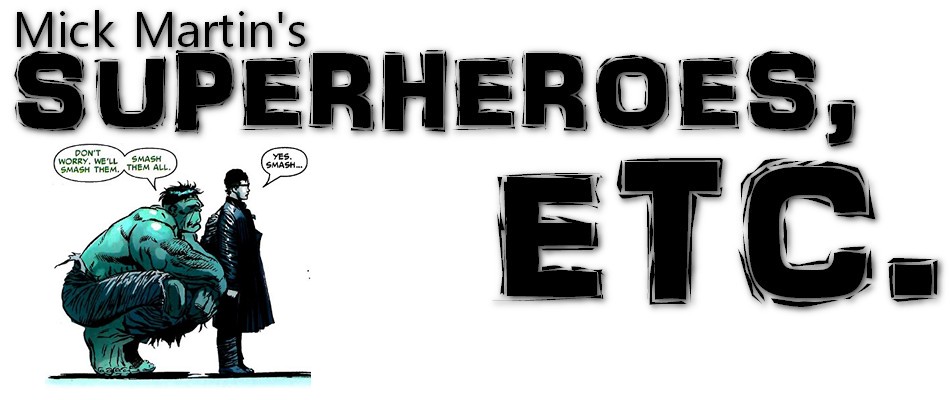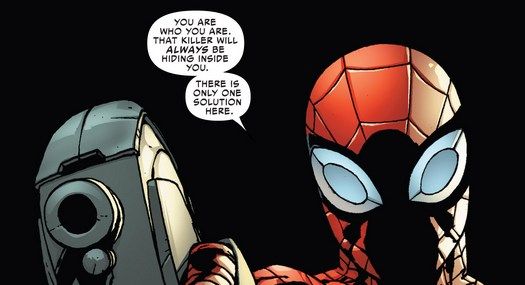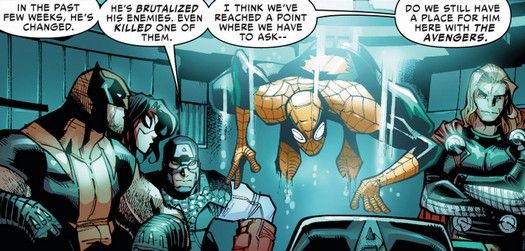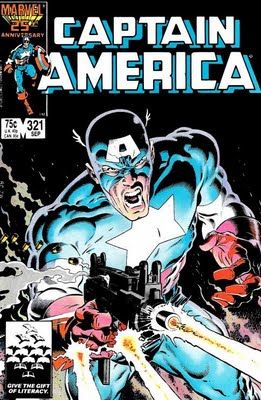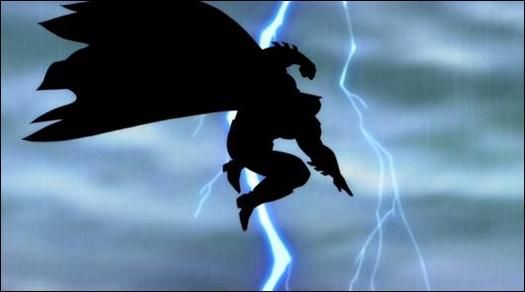Thursday, March 21, 2013
Kill, superhero! Kill!
It's only been in the last few months that I've returned to reading superhero single issues as they're released, and my tastes proved shamefully one-sided. I dipped my toes into the new 52 and found very little to my taste, while I've been more impressed than I could have imagined with Marvel NOW!
One thing I'm not happy with is how the notion of superheroes killing criminals has clearly become more acceptable over the years particularly, it seems, in Marvel.
Now the example pictured above is a special case and, in fact, isn't entirely what I'm talking about. That's Doc Ock in Spider-Man's body about to blow away the amoral villain Massacre in Superior Spider-Man #5 (and I'm enjoying that title way more than I thought I would when I first learned of the concept). Ock/Spidey killing someone isn't particularly surprising, but what I found interesting was part of the fallout in Superior Spider-Man #6.
It wasn't all that long ago that it wouldn't have even been a question whether or not a superhero who killed someone would stay in the Avengers. An Avenger who had killed would, at the very least, be subjected to a court-martial-type deal overseen by his/her teammates. In the case of Ock/Spidey here, who shot a man after he had already been defeated and could have easily been restrained? He wouldn't stand a chance.
For my most recent Extra Medium column over at Popdose, I wrote "The Top 10 Worst and Best Things About The Avengers" (I really do need to get another one out). Under "worst" I talked about how I didn't like seeing the superheroes in the flick killing people. Of course, they're justified. They're fighting a war and for most of the movie, they're on the losing side. Or at least the side with the biggest disadvantages.
What bothers me more is that there's killing without any discussion of killing. It's casual. When I was younger if a superhero killed someone, or even seriously considered killing someone, it would consume them. It would impact them for years. When Captain America shot and killed a terrorist during Mark Gruenwald's classic run, it was one of the many events that ultimately led to Steve Rogers being temporarily stripped of his title, costume, and shield by the US government. More importantly, it was a kidney shot to Cap's soul.
Now, it doesn't seem to bother anyone much. Sometimes it's even just something mentioned in passing. Hawkeye pierces a few throats while rescuing Spider-Man in Age of Ultron #1. In a scene meant to be - at least in part - humorous, Maria Hill shows a man photos of the Hulk ripping a skrull in half in Indesructible Hulk #3. Shanna the She-Devil accidentally kills a Savage Lands tribesman who was attempting to peacefully communicate in Savage Wolverine #3, the scene is treated like slapstick, and when the justifiably enraged tribal warriors attack Shanna and Wolverine, they have no problem using more lethal force in retaliation.
I don't want to start a debate. I think the ship sailed a long time ago unfortunately. But I do want to say two things.
First, ultimately, life is what is of primary concern to the superhero. That's why the term "crime-fighter" has always been incomplete. Bruce Wayne doesn't become Batman because Joe Chill broke his mother's necklace. Peter Parker doesn't become Spider-Man because that crook he let walk got away with too much dough. Superman doesn't dole out parking tickets and Dardevil doesn't give a crap out used car salesmen unless they start killing people. Superheroes care about life, plain and simple. They don't just face death. They wrestle it. And I think to allow characters whose primary enemy is death itself to dole it out is a betrayal of the very concept of the superhero.
Second, earlier this evening I watched part 2 of the animated adaptation of Batman: The Dark Knight Returns, and it was this that inspired this post.
See, what impressed me the most about the adaptation of DKR is the raw power of the source material. The story is almost 30 years old, and along with Watchmen it's suffered many copycats over the years. In spite of all the dark, violent, and edgy superhero comics that came out between the release of the original DKR series decades ago and its more recent adaptation, it remains absolutely goddamn brutal. You will wince when you watch scenes like Batman's bone crushing battles with the Mutant Leader, or his final dance with the Joker.
Yet, in spite of how brutal it is, in spite of how dark and violent, in spite of how its originality and innovation radically changed the landscape of superhero comics; in one of the first scenes of Batman: The Dark Knight Returns, Part 2 Batman saves a liquor store owner from a bunch of thugs and when he sees the shop owner about to kill one of the thugs, he turns on him and says, "Pull that trigger, and I'll be back for you."
So if you're going to tell me that superheroes need to kill in order to be believable, interesting, or modern, save your breath. Because DKR gave us a superhero darker, edgier, a million times more brutal, and certainly more interesting than anything that ever went in or out of Avengers tower, and even he wouldn't cross that line.
Sunday, March 17, 2013
Avengers Arena, reviewing ethos, and hypocrisy (that would be mine)
I was surfing a little bit and found myself at Johanna Draper Carlson's blog. While scrolling through her posts, I followed a link to a column by KC Carlson in which the columnist talks about his likes and dislikes from Marvel NOW!
What struck me the most was what he wrote about Avengers Arena, a comic in which a bunch of younger heroes from titles like Runaways and Avengers Academy are transported to an island by the X-Men villain Arcade and told to fight to the death:
I’ve already dropped Avengers Arena, after giving it five issues (four too many). I will award it Most Tasteless Title of this year, however, as it’s a comic book snuff film, with a bunch of B- and Z-level characters brought together just to be killed off issue by issue. I imagine that younger readers who like first-person-shooter games and other death-happy fare will quite like this. As an older person who’s had to deal with the consequences of real-life deaths, I find this whole genre most offensive. And sad, now that my favorite comic book franchise has succumbed to it.Carlson's reaction didn't surprise me. I felt similarly when I first learned the concept behind the book. But as I gave it a chance, I grew to like it, and found myself feeling similarly to Robot 6's Carla Hoffman. As Hoffman says, the premise of Avengers Arena "feels cheap," but the title ends up being more than just "a comic book snuff film." It has great characterization, powerful and emotional moments that have nothing to do with violence, and on a personal note it's reinvigorated my interest in Marvel's teen hero books.
Now let's forget the fact that the issue at which Carlson apparently gave up on the title (Avengers Arena #5) doesn't actually feature any character deaths. And let's forget about the fact that if he thinks this is the most tasteless title of the year, he needs to check out the new Deadpool, or Marvel's 156th Thunderbolts reboot, or that widely publicized DC event culminating with possibly the most recognizable child superhero in the world being riddled with more bullets than Al Pacino at the end of Scarface and skewered by a giant goddamned sword.
But this: "I imagine that younger readers who like first-person-shooter games and other death-happy fare will quite like this. As an older person who's had to deal with the consequences of real-life deaths, I find this whole genre most offensive." This is not what I expect from a reviewer. This is what I expect from an angry Facebook user. This is not a valid criticism of the content of a comic or the creativity and artistry of its creators. This is taking the easy road. This is saying that something you don't like isn't good because you're superior to the people who enjoy it. This is making things personal.
And what bothers me more than anything is that I know I've done it myself a shit-ton of times. I know I'm catapulting huge boulders inside a glass castle if I trash KC Carlson for doing it. No BS, I've seriously considered going through my blog's reviews and eliminating anything I judge to be "making things personal." The only reason I haven't done it is because I don't know if I'm more of an ass leaving stuff like that up, or hiding it so no one calls me out on it.
I don't know, I think I started this wanting to thrash a reviewer over a couple of sentences that rubbed me the wrong way, and realized I clearly had nowhere to go because I was being a hypocrite. I genuinely don't think what Carlson wrote is a really fair review, but again I don't think I'm innocent of it either. I've been writing reviews of comics for over a decade, and I know without checking that there's no way I haven't crossed a similar line. Maybe it's about time I take a step back and think about whether or not I should have a more defined ethos towards my own reviewing.
P.S. For the record I have dealt with real-life consequences of death. Yeah, I like some first-person-shooters. But, you know, so does Kevin Spacey's character in House of Cards. And that guy's practically Vice President. So, yeah. Check, and mate (not really).
Friday, March 01, 2013
Crisis on Infinite Bed & Breakfasts
Last weekend my girlfriend and I had a wonderful time in the Berkshires. We couldn't afford a long vacation or one spent very far away, so we opted for an overnight trip.
Because
it was its final weekend, we decided to make a visit to the Alex Ross exhibit, Heroes and Villains: The Comic Book Art of AlexRoss, at the Norman Rockwell Museum in Stockbridge,
Massachussetts. Other than the art Ross created as a boy, there
wasn't much at the Ross exhibition I hadn't seen already in one form
or another. But the art from Ross's childhood - including a
Justice League made from construction paper and scotch tape and a
recreation of the Peanuts characters all as DC heroes -was worth the
price of admission all on its own.
After
the museum we drove to Lee to check into the Federal House Inn. It was my first stay in a genuine B & B. Our room was
the Crabtree Room. It had a television that looked like it could've
been someone's desktop monitor 5 minutes before they brought it into the
room, a toasty gas fireplace, floors dangerously slippery to anyone
barefoot or in socks, a four poster bed we practically needed a
stepladder to climb into, and a stand-up shower with the most perfect
water pressure. I defiantly declared to my girlfriend that I would
shower both at night and in the morning. Caring about it seemed a
challenging prospect to her. In the evening there was wine and cheese
on the first floor; and for breakfast we were served a tasty fruit
salad, stuffed french toast, and maple flavored bacon for which I would fight any man.
Of
the images familiar to me at the Alex Ross exhibit, one of the most
striking to behold on a museum wall was the cover for the more recent
editions of DC's Crisis on Infinite Earths. And it was
fun to listen to the commentary from museum visitors who knew a
little bit about the comics, but not quite enough. I bit my tongue as
three women looking at the picture argued about whether or not one of
the twin Supermen was Bizarro.
For
some reason, the fact that Crisis was the first of
the big superhero crossover events inspired me to begin designing my
own Bed & Breakfast. Just as The Federal House had different
names for all their rooms, the fusion of the B & B and Ross
Exhibit experiences inspired me to mentally construct a bed &
breakfast with rooms named and themed after major Marvel and DC
events.
The
Crisis on Infinite Earths Room would be the largest room in the inn,
having been constructed by knocking down walls from four adjoining
rooms and merging them into one.
The
Secret Invasion Room would be filled with ingeniously disguised
furniture. All the necessaries of any home-away-from-home would be
there, but you wouldn't know what it was. The lamp would actually
turn out to be the bed. The TV would be the complimentary shampoo.
The rug would be the envelope provided for cash tips. The toilet
would just be a toilet because why be gross?
The
Onslaught Room would be reserved for members of a very low-effort
version of the Witness Protection Program. Upon the guests' entry to
the room, friends and family will be notified of the guests' deaths.
In fact, the guests' memories will be erased and they will be
spirited away to a completely different land to start new lives. But
with the same exact names for some reason.
The
Secret Wars Room would not be a room anyone could reserve. Rather,
the best and worst guests from other rooms would be secreted from
their beds to the Secret Wars Room to battle for the privilege of
naming the items on the breakfast menu.
The
Civil War Room would be reserved for combative couples arriving a few
months after their promised check-in date.
The
Death in the Family Room would be indistinguishable from other rooms,
other than that during your stay it would seem horribly important and
impacting, but twenty years later you'd realize it really didn't make
a difference.
The
World War Hulk Room would just strut around and beat up other rooms.
The
Our Worlds at War Room would be normal in almost every way, except you
will be subjected to a constant voice-over lecturing you about World War
II even though nothing you will doing will have anything to do with
that.
The
Fall of the Mutants Room would not even really be a room, but you'd
play along anyway.
The
Identity Crisis Room would be filled with fishnet stockings, bondage
gear, and buckets for all the incredibly necessary vomit.
The
Atlantis Attacks! Room would have the worst bathroom ever.
The
Infinite Crisis Room would be stupid.
While
coming up with these rooms, it occurred to me that even if I were
serious, that my desire to run a B & B would start and end with
making up names and themes for the rooms. Once I did that, I would
lose all interest. In fact, I already have lost interest. Now I'm
thinking about cheese.
I'm
lying. Boobs. I'm thinking about boobs.
Subscribe to:
Posts (Atom)
